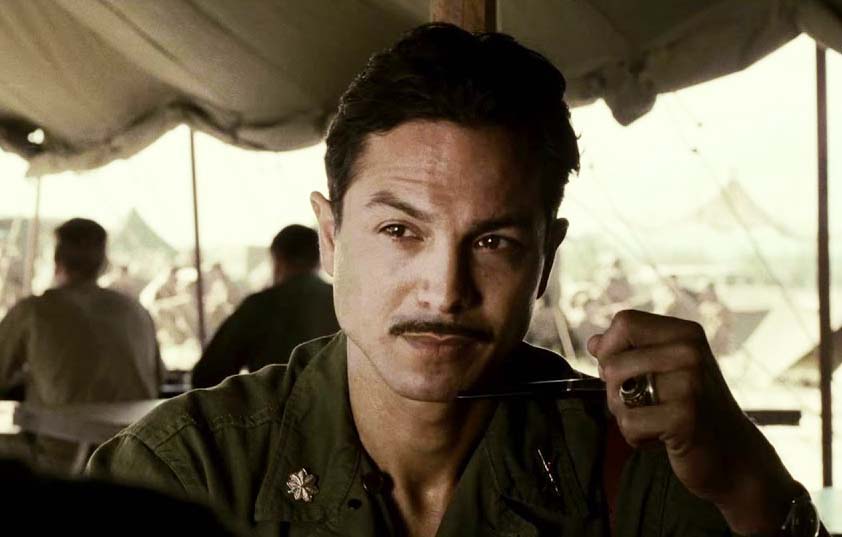Henry Mucci was a tough as nails Army Lieutenant Colonel who became an instant and enduring American war hero in 1945 when he led a raid that rescued 500 survivors of the fall of Corregidor and the Bataan Death March from a Japanese prison camp in the Philippines. It is widely considered the most successful rescue mission in the history of the United States military.
Henry Andrew Mucci was born in Bridgeport, Connecticut, on March 4, 1909, to parents who had immigrated to the United States from Campobasso, Molise, Italy. He was one of 11 children. His first military experience was with the Connecticut National Guard, which he joined at the age of 20. A few years later, after he was initially rejected for being too short, Mucci was accepted into the United States Military Academy at West Point and graduated with a commission in 1936. Two of his brothers also served in the Army and Navy during the Second World War, while his sisters worked in a munitions factory making bazookas.
Colonel Mucci was an officer stationed at Pearl Harbor on December 7, 1941, when the installation came under Japanese attack. He served with honor during the attack and also during the Second Battle of the Philippines (1944-45), but it was near the end of the war that he made his greatest impact.
Based on his extensive infantry background, in February 1943, the U.S. Sixth Army placed Mucci in charge of the 98th Field Artillery Battalion, previously a mule-drawn pack artillery unit. Mucci announced that the Battalion was being converted from Field Artillery to Rangers, downsizing the battalion from 1,000 men to 500. He held a training camp in New Guinea where he utilized commando type training to transform his men from ‘mule skinners’ into an elite Special Forces group. He worked his men hard, but he was the perfect man for the job and had all the qualities of a superb military leader: he knew men, he had vision and he was decisive. After a year of intense training in the Pacific islands, the men of the newly-created 6th Ranger Battalion were ready.
In 1944, as Allied forces fought their way across the Philippines, liberating the islands from Japanese control, troubling reports emerged that the enemy intended to execute prisoners of war in response to the Allies’ advance. General Walter Kreuger chose Mucci to head the liberation of the Cabanatuan prison camp. With General Douglas MacArthur’s blessing and logistical help from 250 Filipino guerillas, Lt. Col. Mucci led his Rangers on this incredibly dangerous mission to rescue Allied POWs.
The remoteness of the camp, the difficulty of the terrain and the large numbers of enemy soldiers in the area, would make a rescue operation extremely difficult at best, impossible at worst. The Cabanatuan camp was thirty miles deep within enemy-held territory and was heavily-guarded. Mucci urged married men to withdraw from the assignment and told his troops that he did not want any atheists. When no one dropped out, he ordered everyone to pray. “I want you to swear an oath before God; swear that you’ll die fighting rather than let any harm come to those prisoners,” he said. With only 48 hours of planning, Mucci’s small coalition trekked through thick tropical jungle.
The force was comprised of 120 Rangers, along with 14 Alamo Scouts, as well as Colonel Mucci. On January 29, 1945, the Scouts would leave roughly 24 hours ahead of the main force to survey the perimeter of the camp. The plan was for the main force to surround the camp and at dusk on January 30, attack and kill the guards. They would then escort the liberated POWs to safety. Heavy casualties for the American Rangers were expected, but each element of the bold plan, if executed to its fullest, would liberate the weak and tormented POWs.
Once the men were in position, the first step was to use a plane as a diversion, which buzzed the camp. It caused confusion among the captors, allowing time for the Rangers to cut the telephone lines, sealing off the camp from communication with the outside world. At 7:40 pm, Camp Cabanatuan came under attack. The raid was entirely unexpected by both guards and prisoners alike and came with lightening efficiency. The assault began by taking out the guard towers and pillboxes ringing the camp. In less than 30 seconds, they were completely destroyed. With simultaneous attacks from both the entrance to the camp and its rear, the Japanese soldiers were completely overwhelmed. By 8:15 pm, the camp was secured. There were two American casualties, while over 500 Japanese laid dead. No POWs were lost during the rescue.
The rescued men, though tattered, often crippled and gruesomely emaciated, were the remnants of 15,000 prisoners captured by Japanese invaders in the opening months of the war. The camp had once held 10,000 men, but disease, mistreatment and brutality by their captors had reduced the numbers daily. 489 POWs were rescued along with 33 civilians. Of the total, 492 were Americans. The returning POWs were able to tell the world of Japanese atrocities at Bataan and Corregidor. This filled the Allies with the resolve to destroy the Japanese Empire once and for all.
Henry Mucci was personally awarded the Distinguished Service Cross by General of the Army, Douglas MacArthur (many felt that he deserved the Medal of Honor) and was promoted to full Colonel. News of the successful rescue operation spread like wildfire throughout the United States and after the war’s end, Mucci was welcomed back as a war hero. In 1947, he married Marion Fountain, with whom he had three children. Later, Colonel Mucci went to work for the Sunningdale Oil Company of Calgary, Alberta, Canada. His address was in Singapore, but Mucci spent most of his time in Saigon. He worked there up to the day before the city’s fall in 1975. Although never confirmed, he is thought for have worked for the Central Intelligence Agency.
Colonel Mucci died at age 88 in Melbourne, Florida on April 20, 1997. Today, a section of the United States Embassy in Rome, Italy is named in his honor. The subject of numerous books, the raid on Cabanatuan was also depicted in the 2005 film “The Great Raid,” the story of the most successful rescue mission in the history of the United States military.




